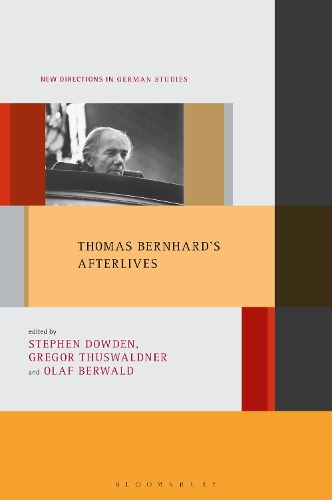
Thomas Bernhard's Afterlives
(Hardback)
Available Formats
Publishing Details
Thomas Bernhard's Afterlives
By (Author) Professor Olaf Berwald
Edited by Professor Stephen D. Dowden
Edited by Dr. Gregor Thuswaldner
Bloomsbury Publishing PLC
Bloomsbury Academic USA
1st October 2020
United States
Classifications
Tertiary Education
Non Fiction
Literary studies: general
833.914
Physical Properties
Hardback
264
Width 140mm, Height 216mm
454g
Description
In his prose fiction, memoirs, poetry, and drama, Thomas Bernhard (1931-1989)--one of the 20th centurys most uniquely gifted writers--created a new and radical style, seemingly out of thin air. His books never tell a story in the received sense. Instead, he rages on the page, he rants and spews vitriol about the moral failures of his homeland, Austria, in the long amnesiac aftermath of the Second World War. Yet this furious prose, seemingly shapeless but composed with unparalleled musicality, and taxing by conventional standards, has been powerfully echoed in many writers since Bernhards death in 1989. These explorers have found in Bernhards singular accomplishment new paths for the expression of life and truth. Thomas Bernhard's Afterlives examines the international mobilization of Bernhards style. Writers in Italian, German, Spanish, Hungarian, English, and French have succeeded in making Bernhards Austrian vision an international vision. This book tells that story.
Reviews
A masterful set of essays on Bernhards oeuvre .... Taken together, the eleven chapters of this book represent some of the best scholarship in English to date on Bernhards remarkable impact on the world of postwar. ... There is too little space in a review like this to do justice to the breadth and quality of each of the other contributions. They represent literary scholars from across the major Western languages and have given us an essay collection thats truly useful: a sophisticated introduction to Bernhards echo in Euro-American prose. * Journal of Austrian Studies *
More than three decades after his death, Thomas Bernhard has become an author of world literature. The resonance of Bernhards voice in the works of numerous contemporaries far beyond the borders of Austria provides powerful testimony of this fact. In its exploration of this resonance, this remarkable volume makes a significant contribution to Bernhard criticism. Through their forays into Bernhards international reception, the essays collected here open up new and extended vistas into the uvre of one of the foremost German-language writers of the 20th century. * Manfred Mittermayer, Director, Literaturarchiv Salzburg, University of Salzburg, Austria *
In this insightful volume, we learn about the many ways in which authors across the globe have sought to emulate the great Thomas Bernhard (1931-1989), from 'anticipatory plagiarism' to 'coinhabiting palimpsests.' Writers like Susan Sontag, W.G. Sebald, Geoff Dyer, Imre Kertsz, Italo Calvino, and Horacio Castellanos Moya have turned to the brilliantly querulous Austrian to pursue their own political or aesthetic projects. Their takings have been devious, inclusive, maddening, profound, liberating. There are numerous avenues still to pursue with Bernhard, and this volume explores one fruitful possibility. * Fatima Naqvi, Professor of Germanic Languages and Literatures, Yale University, USA *
Author Bio
Olaf Berwald is Chair of the Department of Foreign Languages and Professor of German at Kennesaw State University, USA. His most recent book is A Companion to the Works of Max Frisch (2013). Steve Dowden is Professor of German Literature at Brandeis University, USA. He is the author of three previous books, including Kafkas Castle and the Critical Imagination (1995), and the editor or co-editor of four books, including Tragedy and the Tragic in German Literature, Art, and Thought (2014; co-edited with Thomas P. Quinn). Gregor Thuswaldner is Provost and Executive Vice President at Whitworth University in Spokane, Washington, USA. His most recent book is The Hermeneutics of Hell: Visions and Representations of the Devil in World Literature (2017).
